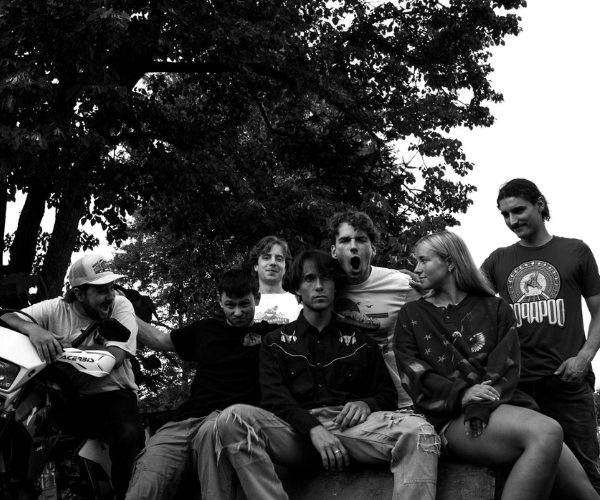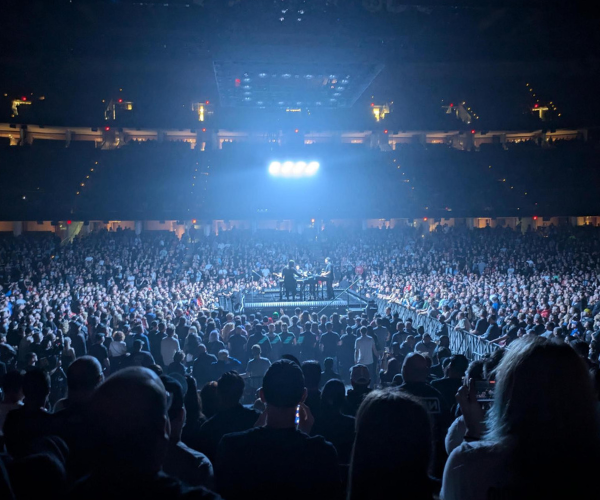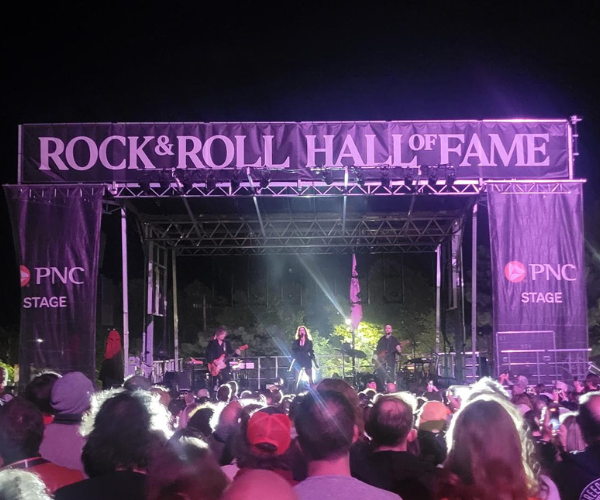At a Signals Midwest show, it’s impossible to keep still. While the Cleveland quartet churns out taut punk rock driven by racing tempos and live-wire riffs, throngs of Cleveland diehards throw their bodies together, screaming back each lyric, diving into frenzied mosh pits or lifting band members above their heads to crowdsurf human waves.
Signals Midwest’s Oct. 12 gig at the Grog Shop was no exception, doubling as a celebration of the beloved act’s 10th anniversary.
The band pulled out rarities, performing fan-favorite “The Weight & The Waiting” for the first time in six years. They reunited with original bassist Loren Shumaker, who left the group in 2017 and was replaced by Ryan Williamson, for a set that included the first song Signals Midwest ever wrote together, “Forward, Never Straight.”
Vocalist Max Stern’s mom even crowdsurfed. “She floated around for a while and then made it to the stage and didn’t know what to do,” Stern says, “then just awkwardly gave me a hug and got off.”
For Stern, the night was a full-circle moment. He grew up blocks away from the venerable Cleveland Heights club and started seeing shows there as a kid. Later, his high school band booked the venue.
Today, Signals Midwest still considers the Grog a home away from home, although the October gig truly put things in perspective.
“To see younger people who are just discovering us now, along with people in their 30s, 40s, 50s who have been following us for a while was very humbling and sweet,” Stern says. “We didn’t start this with any real goals other than to put a record out and try and get out of Cleveland a little bit — or at least play some cool, local stuff.”
But not every cool, local act makes it to this milestone —- or gets covered by national music pubs such as The A.V. Club, Spin and Alternative Press. Signals Midwest is one of the city’s biggest music success stories of the last decade, touring throughout the U.S., Europe and Australia. The trips come courtesy of four beloved full-length LPs of intricate melodic-punk, propelled by meditative lyrics about trying to find your place.
Signals Midwest has done it while maintaining a DIY ethos, working with like-minded collaborators such as the indie record label Tiny Engines.
“We still book all our own shows,” Stern says. “We’ve literally flown across the world based on Facebook messages that I’ve gotten from people that like our band.”
The band formed in 2008 with Stern, Shumaker and drummer Steve Gibson; guitarist Jeff Russell joined in 2010 after moving to Cleveland from Hutchinson, Kansas.
They quickly found a home in the DIY punk scene, becoming mainstays in Cleveland’s thriving house-show circuit. Steady gigs included Lakewood’s Soggy Dog House, Tremont’s now-closed Dag House and a Cleveland Heights outpost called the Milk Crate House, where every band member lived at one point.
“It was exciting to see something completely community-oriented and self-sustaining,” Stern says. “All of a sudden, we didn’t need a fancy venue or a promoter or presale tickets. You basically just needed a Myspace page, a PA system and a basement or living room.”
“Pin,” a song off the band’s upcoming, as-yet-untitled LP, includes a memorial for Dag House, which shuttered in 2016. Another track, “Sanctuary City,” chronicles evolving neighborhoods, including the Tremont community Dag called home. “The first line is, ‘I wonder what they’ll build next here,’ ” Stern says. “It’s very much reflective of watching this thing grow and change.”
Though not about them specifically, the song’s chorus (“There’s so many other things to be”) could also apply to the band’s transformation, a mindset shift that encompasses playing with other acts, Stern’s move to Philadelphia for an ad agency art director gig, as well as Pittsburgher Williamson’s addition.
The group has been exploring stylistic changes too, experimenting with more concise tracks on some of the “fastest songs [they’ve] ever done.”
“We’re trying to figure out how to balance this thing we love while not neglecting the other parts of our lives that I think we definitely did for a while,” Stern says. “That’s a balance I think about every day.”
But these obstacles can’t derail the act’s momentum. “There’s some energy that gets summoned up from the four of us all being together,” he says. “It’s one of the things I hold closest to my heart.”




